Marvin Vincent Collection (7 vols.)
Digital Logos Edition
Overview
Marvin Vincent, one of the most prominent Bible scholars of the nineteenth century, was also a prolific writer, teacher, professor, and pastor. As a major Greek scholar, textual critic, and Bible translator, his writing is characterized by careful exegesis and attention to historical context of Scripture. In this 7-volume collection, his most famous exegetical work, History of the Textual Criticism of the New Testament, is included, as well as his practical resources on preaching. Vincent also wrote several essays on topics such as entertainment and Biblical criticism, which are contained in this collection as well.
Vincent’s writing is academic yet highly readable, perfect for students, pastors, and anyone wanting an introduction to Biblical criticism and practical application of Scripture. Marvin Vincent Collection (7 vols.) contains over 1,800 pages of Biblical scholarship and exegesis. With the Logos edition, all Scripture references are linked to the other resources in your library, making study and research effortless.

Key Features
- Perfect for students and pastors
- Contains 1,800 pages of exegesis and commentary
- Includes bibliographies, indexes, and cross-references
Product Details
- Title: Marvin Vincent Collection (7 vols.)
- Author: Marvin Vincent
- Volumes: 7
- Pages: 606
Individual Titles
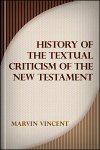
This landmark work of textual criticism has been a standard since its publication in 1899. Vincent not only introduces the topic of textual criticism, including terms and definitions, but gives its evolution beginning with the writings of the New Testament, and how they were perceived up until the late 19th century. He provides examples and discoveries of manuscripts throughout, as well as definitions in the margins and bibliographies. Vincent’s work is highly readable yet gives an accurate history of textual criticism.
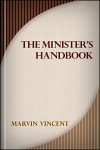
The Minister’s Handbook provides practical forms and Scripture references for pastors. Vincent includes guides for infant dedications, marriage, funerals, ordinations, and the Lord’s Supper. He also gives Scriptures for illness.
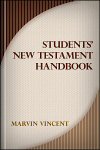
This resource was written for seminary students and ministers to quickly gain an understanding of Scripture and surrounding studies and criticisms. Vincent divides the work into several different parts: language, text, history of the canon, criticism, setting of the New Testament, history of exegesis, including a commentary section. There is also an extensive list of Bible scholars and works for further study. This is perfect for busy students and pastors, as the information is condensed and concise. It also serves as an historical introduction to the state of Biblical scholarship in the late-nineteenth century.

In this work, Vincent outlines the history of the papacy’s rise to absolute power in the Early Middle Ages. He begins with a brief introduction to the circumstances leading up to the election of Hildebrand of Sovana as Pope in 1073, who was canonized as Gregory VII. Gregory VII fought for the authority of the Church to elect its own officials, instead of the state. Vincent traces the influence of Gregory VII and his ideologies through 1303, with the death of Pope Boniface VIII. This volume includes a preface, detailed table of contents, bibliography, and is written in an engaging style.
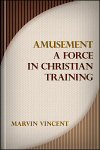
In four essays, Vincent draws attention to the relationship between the church and entertainment. He maintains that the church must realize that amusement plays a part in daily life and argue for moderate enjoyment of entertainment. Vincent examines questions of conformity, entertainment, and what is appropriate for young people. He also addresses the response of churches and pastors to popular forms of entertainment.
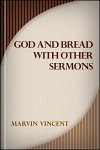
This is a collection of twenty sermons delivered by Vincent to his congregation. Vincent published them at their request.
Sermons Include
- God and Bread
- Does it Pay?
- The Single Need
- Facing God
- Light and Loyalty
- The Ordered Steps
- Fidelity and Dominion
- Extra Service
- The Pride of Care
- The Plough and the Kingdom
- Joy and Judgment
- Silent before God
- A Leper's Logic
- Prayer and Panoply
- The Daysman
- The Lesson of Ripeness
- Strength, Victory, and Knowledge in Youth
- God and the Times of Ignorance
- The Promise of Incompleteness
- Only a Little While
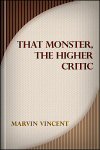
In this short essay, Vincent argues for a redefinition of Biblical criticism. He maintains that while not all forms of criticism are worthwhile, critical thinking is necessary to read Scripture intelligently. Vincent goes over differences between beneficial criticisms vs. mere opinions. This volume considers many points of view and will be of value to students, pastors, and those wanting a greater understanding of practical Biblical criticism.
About Marvin Vincent
Marvin Vincent was born in 1834 in New York, the son of a clergyman. A professor at Union Theological Seminary and a pastor, Vincent was best known for his work in textual criticism and Biblical scholarship.